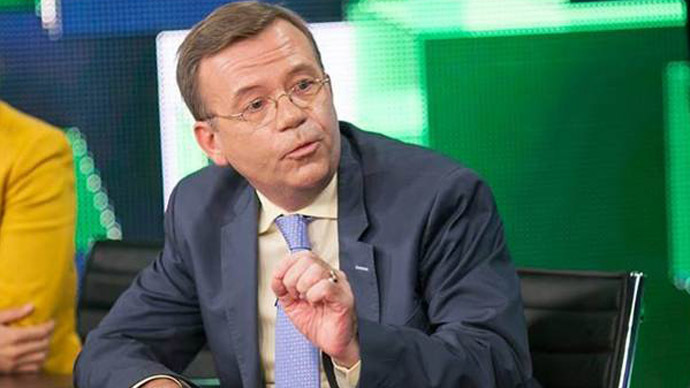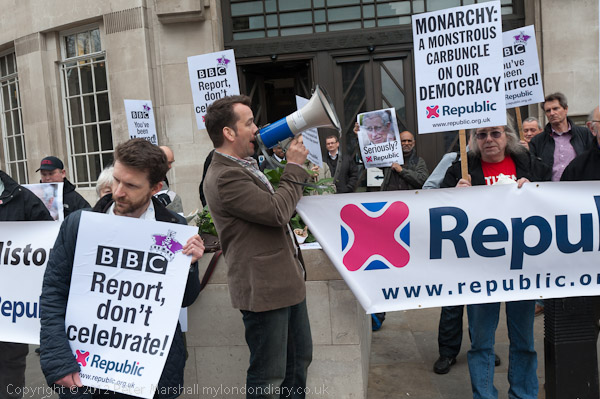 Stuart J. Hooper
Stuart J. Hooper
21st Century Wire
Is it really this easy to launch an inquiry in 2015, the era of multi-mass-media, where you can find a biased view with the click of a mouse or swipe of a touch screen? What makes television so special?
Broadcaster RT is facing an inquiry after one viewer, apparently so deeply offended by the allegedly ‘anti-Western’ views being broadcast, felt the need to complain to British TV and radio regulator Ofcom. The comments were made on Peter Lavelle‘s popular show CrossTalk, and supposedly breached impartiality standards.
21WIRE’s own Patrick Henningsen (a ‘westerner’!) appeared on Lavelle’s show earlier this year, and CrossTalk is regarded as one of the most fast-paced and challenging programs on RT.
RT’s CrossTalk is being anonymously accused of airing “anti-western views” during a December 23rd broadcast. So how is a media outlet supposed to regulate what its guests say, without outright censorship and blacklisting of certain subjects? And what can RT do when any British pundits or politicians who oppose Russia will not come on RT to discuss their view points? Suppose a memo went out in Westminster telling MPs not to go on RT? What then?

Public Enemy Number One for Ofcom: CrossTalk’s American host, Peter Lavelle.
Western mainstream media is quick to accuse RT of being ‘Kremlin-backed‘, but always forgets to mention that the BBC is an entirely British state-funded institution. British citizens are required to pay for a Television License, to fund the BBC – no, that is not a joke.
If accusations of impartiality from RT always stem back to that fact, why is the BBC not facing exactly the same scrutiny? British group Republic, campaigning for the abolition of the backward, medieval, British Monarchy, threatened the BBC with legal action after their entirely biased and impartial coverage of the ‘Royal’ Jubilee celebrations.
What nobody seems to be pointing out here is the ridiculous nature of the Ofcom system. How can a single complaint lead to an all out inquiry and damaging consequences for a broadcaster? This is 2015, not 1975. Why are TV and radio held to such a high, near-omniscient standard? RT shouldn’t be too worried, after all, they have the most viewed news channel on YouTube with over two billion views at the end of last year. It’s almost like they’re doing something right to be garnering such high viewership. How does Ofcom view the weight of one complaint against these two billion people?
In 2014, with only one anonymous complaint from ATVOD, a shadowy subsidiary of Ofcom, one British alternative media outlet’s YouTube channel was effectively pulled off the air. The UK Column were only given the option to place their YouTube videos under control of Ofcom/ATVOD. Rather than be placed under a broadcast regulatory regime, the UK Column decided to close down their channel.
Anyone reading this article could head to Google right now and search for quite literally any topic or subject area. They would be presented with hundreds, if not thousands or even millions, of different views, angles and debates on that topic. Some will be factual, some will be biased, some will be impartial and some will be flat-out lies. Why are we not scrambling to protect those offended by views presented online? Maybe, because that would be ridiculous.

Anti-Monarchy group Republic’s protest against the BBC
OFCOM Invisible in Run-Up to Iraq War
Bear in mind, Ofcom operates in the same country where over 750,000 people protested against the 2003 Iraq War in the UK’s biggest ever protest. Their concerns were ignored and over 1 million Iraqis were killed in the subsequent conflict. Also, 50,000 people went to the streets of Britain to protest the government’s plan to raise university tuition fees. Their concerns were also ignored and the fees were tripled.
This calls into question the motives and intentions of Ofcom. Is censorship, perhaps, their true agenda? Why does the UK government not take the concerns of hundreds of thousands of people seriously? Meanwhile, a single complaint can potentially destroy an entire media outlet.
The advent of the internet and mass-communication technologies reveals the archaic and out-of-touch nature of Ofcom’s system. Being offended cannot be a crime, but as long as it is why not use that to your advantage?
Have you been offended by pro-Western comments aired by mainstream media? We would like to express our utmost condolences to you for having to suffering this tremendous, life-altering, psychological damage. Why not go ahead and file a formal complaint with Ofcom? Maybe you could also consider legal proceedings, like the historic case challenging the BBC’s 9/11 coverage? Find out how to complain here.
Alternatively, you could show your disapproval like most other people do in 2015 – with a thumbs down or negative comment. While cuts are on the agenda in Britain, let’s cut this irrelevant institution’s ‘grant-in-aid from the Government‘.
Follow me here: http://twitter.com/StuartJHooper
Russia Today faces inquiry over anti-western comments in Ukraine debate
Russia Today is to be investigated by media regulator Ofcom over anti-western comments in a late-night discussion on Ukraine – its sixth ongoing inquiry into the Kremlin-backed news channel following complaints by viewers.
The regulator, which threatened Russia Today, or RT, with statutory sanctions after repeated breaches of broadcasting regulations on impartiality last year, faces a new investigation over its Crosstalk programme broadcast on 23 December last year.
The programme is understood to have featured a number of anti-western views in the discussion between the presenter and three studio guests, prompting one viewer to complain.
RT was summoned to a meeting with Ofcom last year after four separate reports, all broadcast in March last year and all dealing with the situation in Ukraine, were judged to have breached the code governing UK broadcasters.
RT, which began broadcasting in the UK nine years ago and a launched a dedicated UK channel last year, has previously breached UK broadcasting regulations on 10 occasions on a wide range of issues, including due impartiality, graphic images, and issues related to advertising.
Continue reading the full story on The Guardian
READ MORE PROPAGANDA NEWS AT: 21st Century Wire Propaganda Files














